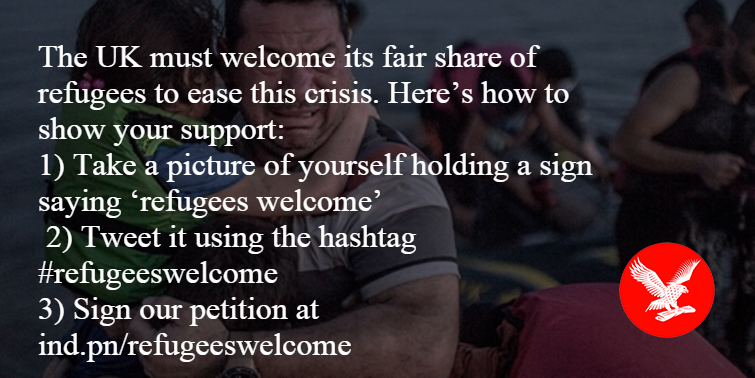10,000 refugees reach Munich and are greeted with food, water and teddy bears
Sophie Hardach reports from Germany's 'turnstile city' on the tumultuous welcome

Your support helps us to tell the story
From reproductive rights to climate change to Big Tech, The Independent is on the ground when the story is developing. Whether it's investigating the financials of Elon Musk's pro-Trump PAC or producing our latest documentary, 'The A Word', which shines a light on the American women fighting for reproductive rights, we know how important it is to parse out the facts from the messaging.
At such a critical moment in US history, we need reporters on the ground. Your donation allows us to keep sending journalists to speak to both sides of the story.
The Independent is trusted by Americans across the entire political spectrum. And unlike many other quality news outlets, we choose not to lock Americans out of our reporting and analysis with paywalls. We believe quality journalism should be available to everyone, paid for by those who can afford it.
Your support makes all the difference.Some recounted their horrors. Others silently clutched their children, deaf to the cheers and applause from German bystanders. The youngest of the refugees to arrive in Munich was a baby girl – part of her umbilical cord still attached – born in a Hungarian railway terminal.
Germans greeted the refugees on 6 September, as they had done the day before, with fruit, cereal bars and stuffed toys for the children. Young couples dressed in Bavarian dirndl dresses and Lederhosen watched and waved. A couple with a toddler held a handmade banner which read: “Willkommen in Deutschland! Welcome to Germany!” Arabic-speaking volunteers danced in a circle with Kurdish women from Syria.
Over the weekend, Munich became Germany’s turnstile for refugees who had travelled through Austria from Hungary. From Munich’s railway station, thousands were taken in buses to emergency shelters before being housed elsewhere in Bavaria. While many want to stay in Germany, some plan to slip away. Soran, a 28-year-old Iraqi Kurd fleeing Isis, was hoping to continue to Britain, where he has relatives. “I want to become a British citizen, and just not think about the past,” he said.
Those who had set out to walk the 110 miles from Hungary to Vienna were met by a convoy of up to 140 cars and vans filled with food, water and soft toys. Onlookers clapped and chanted: “Say it loud, say it clear, refugees are welcome here,” as volunteers loaded the vehicles with provisions.
Hozan Kalo, a Syrian who stepped off the train in Munich, seemed delighted if a little overwhelmed by the fuss. With him was his older sister, Lina, her husband and their two-year-old child. They tried twice to cross by boat to Greece from Turkey, having to turn back the first time in rough seas.
“It was very dangerous,” Mr Kalo said, adding that he could not swim. Walking past the cheering crowds, he talked about his plans to stay in Germany and study English. His sister, however, was more anxious. “Where are they taking us?” she asked, utterly exhausted.
More than 10,000 refugees who reached Munich over the weekend had fled violence and persecution, dodged fences and border police, boarded rickety boats without knowing how to swim. Overnight from Saturday to Sunday, 1,200 arrived. They were immediately herded on to trains and sent further north, to cities including Dortmund.
Sending them to other cities dashed the hopes of some Syrians already living in Germany. Many had been waiting for the last train of the day until the early hours, believing long-lost relatives were on it.
“My mother is on that train,” one cried, trying to break through the police cordon to reach the crowd of refugees at the other end of the platform. “Please, I have not seen them in 10 years,” pleaded another Syrian who believed his sister-in-law and her two children were on the train. Stunned, they had to watch as it pulled out of the station.
Asked how many refugees Munich could accommodate, Mayor Dieter Reiter told reporters: “That’s not the question I am asking myself. I am, every day, asking myself: ‘How can we accommodate these people, these refugees who are coming, how can we give them the feeling that they are safe here in Munich?’”
German Chancellor Angela Merkel’s decision to allow the influx caused a rift in her conservative bloc, with her Bavarian allies accusing her of giving “a totally wrong signal” to Europe. Bavarian Interior Minister Joachim Herrmann, whose Christian Social Union is the regional sister party of Ms Merkel’s Christian Democrats, accused her of having pushed forward without consultation.
That was certainly the case for the baby born in Hungary. She was rushed to a Munich hospital and was “doing well under the circumstances”, a city health official said.
Hundreds of ordinary Germans gave up their weekend to join the effort. Christiane Goder, 24, was on her way to a museum when she decided to go to the station instead. “I’m close to tears,” she said. “I just want to help.”
This newspaper has started a campaign for the UK to welcome a fair share of refugees.

Join our commenting forum
Join thought-provoking conversations, follow other Independent readers and see their replies
Comments